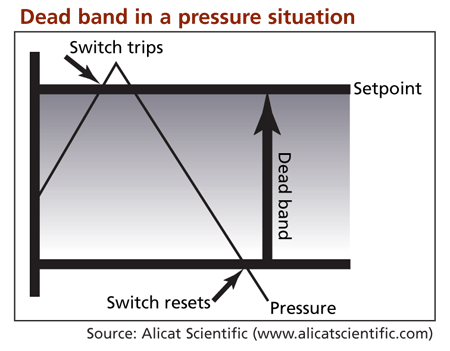AutoQuiz is edited by Joel Don, ISA's community manager.
Today's automation industry quiz question comes from the ISA Certified Control Systems Technician (CCST) program. Certified Control System Technicians calibrate, document, troubleshoot, and repair/replace instrumentation for systems that measure and control level, temperature, pressure, flow, and other process variables. Click this link for information about the CCST program. This question comes from the Level I study guide, Domain 3, Troubleshooting. Level I represents a professional who has a five-year total of education, training, and/or experience.

The dead band of an instrument is:
a) the band that prevents the instrument from being tampered with by unauthorized persons
b) the range of valves for which the instrument gives inaccurate readings
c) the size of the instrument indicated by the divisions on the scale of the instrument
d) the range that an input signal may be changed on reversal of direction without an observable change in the output
e) none of the above
In process instrumentation, the dead band is the range through which an input signal may vary, upon reversal of direction, without initiating an observable change in output signal.
The Automation, Systems, and Instrumentation Dictionary adds these notes as further definition.
Note 1: There are separate and distinct input-output relationships for increasing and decreasing signals.
Note 2: Dead band produces phase lag between input and output.
Note 3: The instrumentation industry expresses dead band as a percentage of span.
Note 4: ANSI/ISA-51.1-1979, revised 1993, pertains to dead band.
The correct answer is D.






